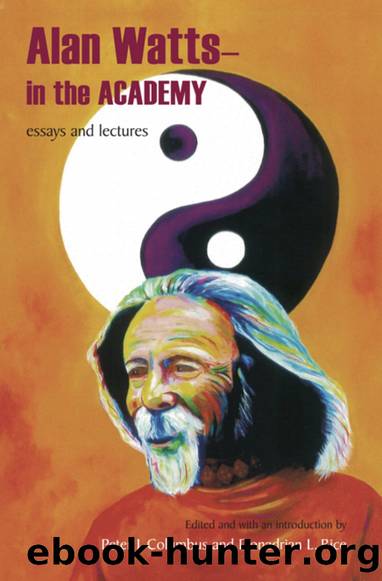In the Academy: Essays and Lectures by Alan Watts

Author:Alan Watts [Watts, Alan]
Language: eng
Format: epub
ISBN: 9781438465562
Google: _m2-DgAAQBAJ
Barnesnoble:
Publisher: State University of New York Press
Published: 2017-03-15T05:00:00+00:00
THE NATURE OF GOD
The five proofs of St. Thomas tell us not only that God exists; they tell us also something of what God is like. From the first, which has to do with motion, we learn that God is power. From the second, dealing with God as the First Cause, we see that God is creative power. From the third we learn not just that God has being, but that he is Being itself. The fourth adds to this that God is not mere being; he does not simply exist like a stone, or a man after a heavy dinner. God is the fullness of Being, possessing every perfection of which Being is capable. And finally the fifth tells us that God is the source of all intelligence, order, and design.
Reason, therefore, leads us not only to the fact that God is; it gives us also some knowledge of his nature, though this knowledge is incomplete beside Godâs own revelation of himself in the prophets and in Jesus Christ. There are, however, three specially important aspects of the divine nature that reason deduces from our experience of the universe, and though implied in the foregoing argument, it will be well to examine them more closely since nothing detracts more from belief in God than absurdly unworthy ideas of his nature.
1. The first is that God is life. The sufficient cause of a universe containing persons must, as we saw, be at least personalâthat is to say, a living, conscious, intelligent and integrated being. God is the most of qualities that we find in more or less degree in the world, and because created things are more or less alive God is that which is most alive. The higher a form of life, the greater its degree of consciousness and integration, and the greater its independence of physical limitations. We are thus led to the thought of God as one who is absolute consciousness, absolute wholeness and unity, and absolute freedom from other than self-imposed limitation. Therefore to say that God is personal is in no sense to limit or belittle him. It is not to imprison God in a form or shape. On the contrary, it is to say that he is the absolute maximum of life and freedom, bursting, as it were, the bonds of form and finitude not because he is vague and misty but because he is utterly and intensely alive.
The idea of a personal God is so often criticized as idolatry, as making God in manâs image. But the alternatives offered by such critics are yet more idolatrous since they conceive God in terms of less living forms than manâas blind and abstract mechanism, force or principle, unlimited only in the inane and vacuous sense of infinite space or aether. The error of idolatry is not that it makes a finite image of the infinitely Vast and Vague, but that it is an attempt to capture the infinitely Alive One in a fixed, dead and petrified form of thought or imagination.
Download
This site does not store any files on its server. We only index and link to content provided by other sites. Please contact the content providers to delete copyright contents if any and email us, we'll remove relevant links or contents immediately.
The Way of Zen by Alan W. Watts(6601)
Ego Is the Enemy by Ryan Holiday(5415)
The Art of Happiness by The Dalai Lama(4125)
The Book of Joy by Dalai Lama(3976)
Why Buddhism is True by Robert Wright(3446)
Spark Joy by Marie Kondo(3299)
Shift into Freedom by Loch Kelly(3194)
Happiness by Matthieu Ricard(3040)
A Monk's Guide to a Clean House and Mind by Shoukei Matsumoto(2912)
The Lost Art of Good Conversation by Sakyong Mipham(2651)
The Meaning of the Library by unknow(2565)
The Unfettered Mind: Writings from a Zen Master to a Master Swordsman by Takuan Soho(2307)
The Third Eye by T. Lobsang Rampa(2260)
Anthology by T J(2207)
Red Shambhala by Andrei Znamenski(2193)
The Diamond Cutter by Geshe Michael Roach(2058)
Thoughts Without A Thinker: Psychotherapy from a Buddhist Perspective by Epstein Mark(2014)
Twilight of Idols and Anti-Christ by Friedrich Nietzsche(1892)
Advice Not Given by Mark Epstein(1878)
